Many are excited to break old habits and embrace new ones, particularly when preparing for significant events like getting a tattoo. In the past, I often stepped inside the tattoo shop unprepared, making the experience much harder than it needed to be. Whether it’s your first or hundredth tattoo, proper preparation the night before can transform your session into a smoother and more enjoyable process.
Before Getting a Tattoo: Short Guide
Curious about what comes next? Let’s go through each point together!
1. Get a Good Night’s Sleep

Making sure you’re well-rested before a tattoo session is necessary. Coming in tired can make your appointment feel much longer, and your body may become more sensitive to pain. It’s important to go to bed earlier than you normally would, allowing for extra time to rest and fall asleep, especially if you’re nervous.
This way, you’ll be alert and in tune with your body’s signals, ready to react appropriately during the process. Your artist will appreciate being able to work with care and detail without interruptions from you falling asleep in the chair or continuously yawning and stretching. If you didn’t get the best night’s sleep, let your artist know so they can adjust their approach if needed.
2. Stay Hydrated
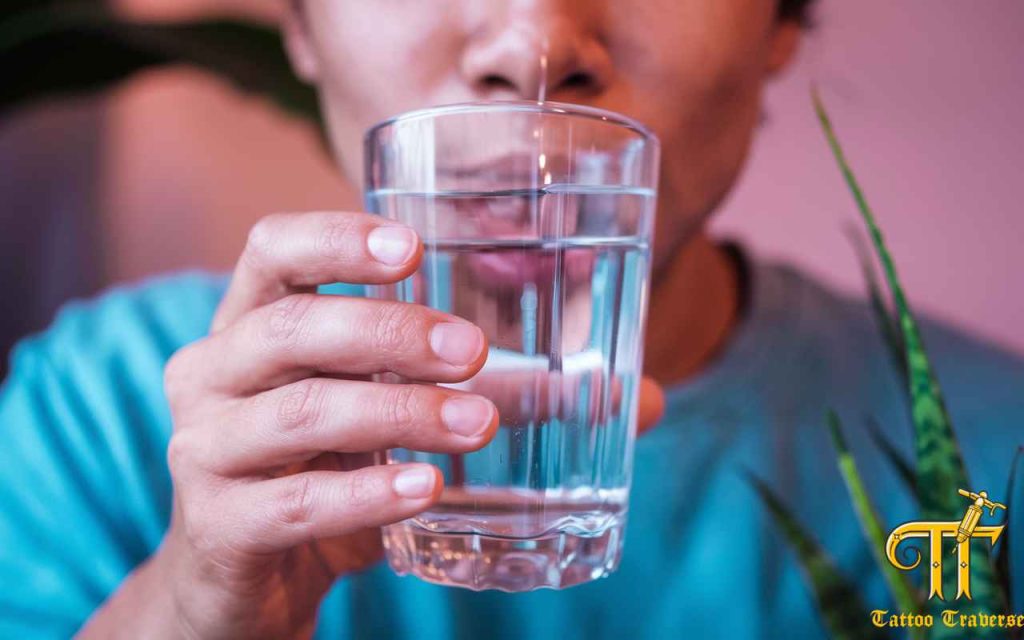
When preparing for a tattoo appointment, it’s crucial to focus on staying hydrated. Drinking plenty of water—specifically, aiming for at least eight 8-oz glasses within 24 hours before your session—ensures that your body is in the best shape to handle the stress of tattooing.
A well-hydrated body helps maintain health and skin elasticity, which is beneficial not just for enduring the tattoo session but for healing afterward. Whether you’re sitting for a long session or bracing yourself in an uncomfortable chair, maintaining hydration helps in faster recovery and better ink absorption. Always remember, the goal is to keep drinking water throughout and after the process to aid in quick and effective healing.
3. Prepare Your Skin
In the days leading up to your tattoo appointment, it’s essential to establish a solid skincare routine to prevent flakey skin and ensure your skin is in the best condition for receiving new ink. A crucial part of this routine is to regularly apply a high-quality moisturizer; however, remember it’s best not to moisturize immediately before your session.
Any residue from creams or lotions can interfere with the tattooing process, potentially affecting the quality of your tattoo. By following these steps carefully, you prepare your skin to accept the ink smoothly, making the entire session and subsequent healing process go as smoothly as possible. Proper care before and after getting your tattoo is essential to avoid infection and scarring
4. Eat Well
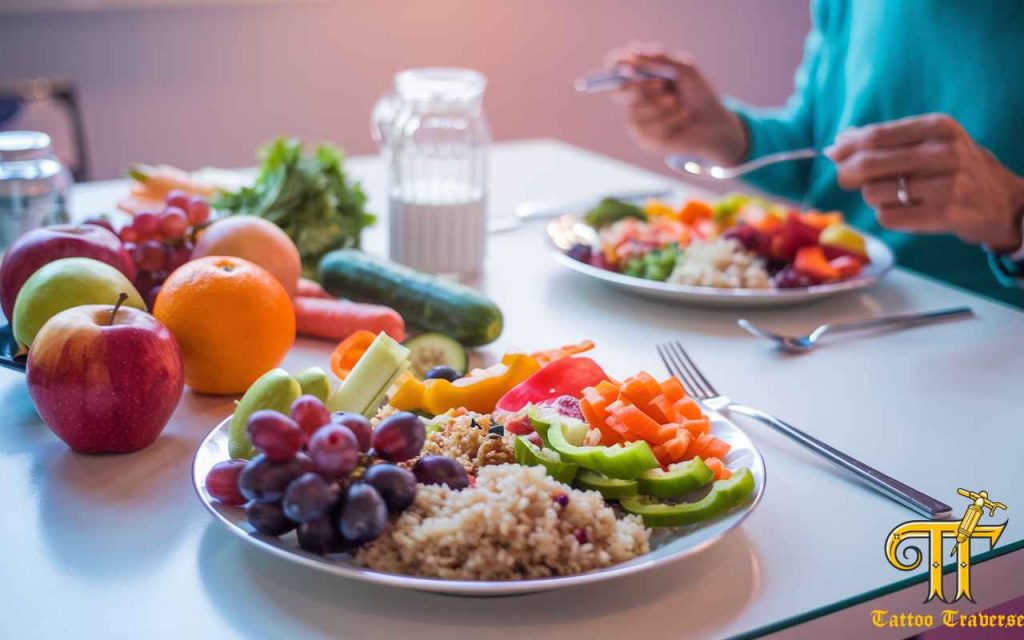
Ensuring your body is well-nourished after getting tattooed is crucial for a comfortable night’s sleep. The trauma of a new tattoo means your body is expending more energy to heal. Eating balanced meals helps maintain stable blood sugar levels, preventing any additional discomfort or painful sensations during the night. This is especially important as fluctuations in energy can lead you to feel shaking or unsteady, which isn’t ideal when trying to preserve the quality of your new artwork.
5. Avoid Alcohol
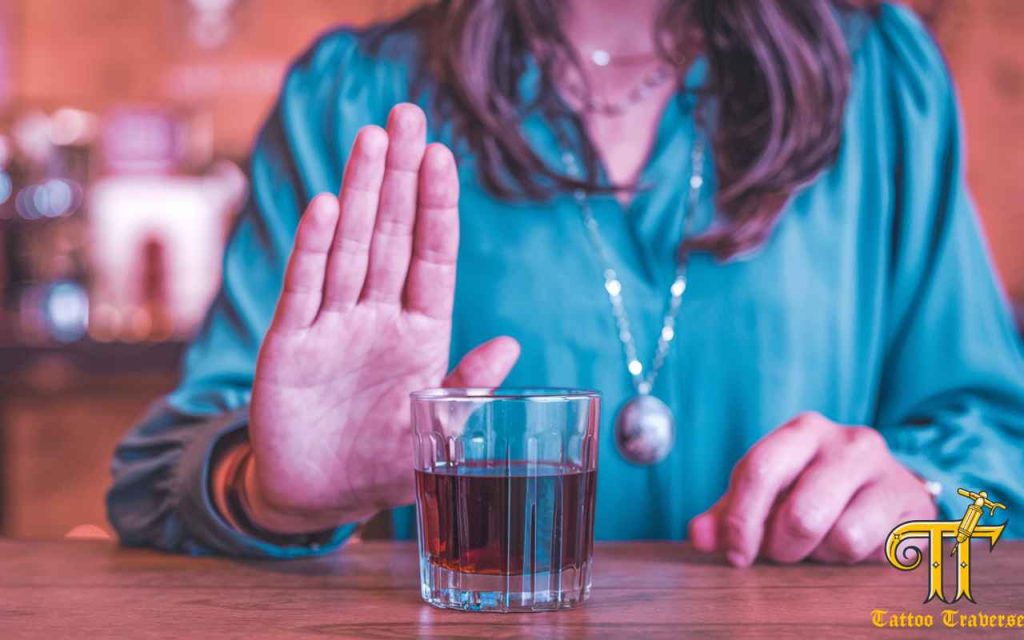
It’s important to confirm after getting a tattoo that you can sleep comfortably to aid in the healing process. Drinking alcohol might sound appealing as a way to ease the pain, but it can make your night challenging. Being hungover amplifies the discomfort of a new tattoo, turning your rest into a real circle of hell.
Alcohol can cause you to feel nauseous, endure a splitting headache, and make you want to lay in bed all day, desperately wishing for the bed to stop turning. Also, any movement might feel like you’re being poked by needles again, forcing you to not move a muscle for hours. Opting out of that nightcap can drastically improve your night’s rest with your new tattoo.
6. Wear Comfortable Clothing
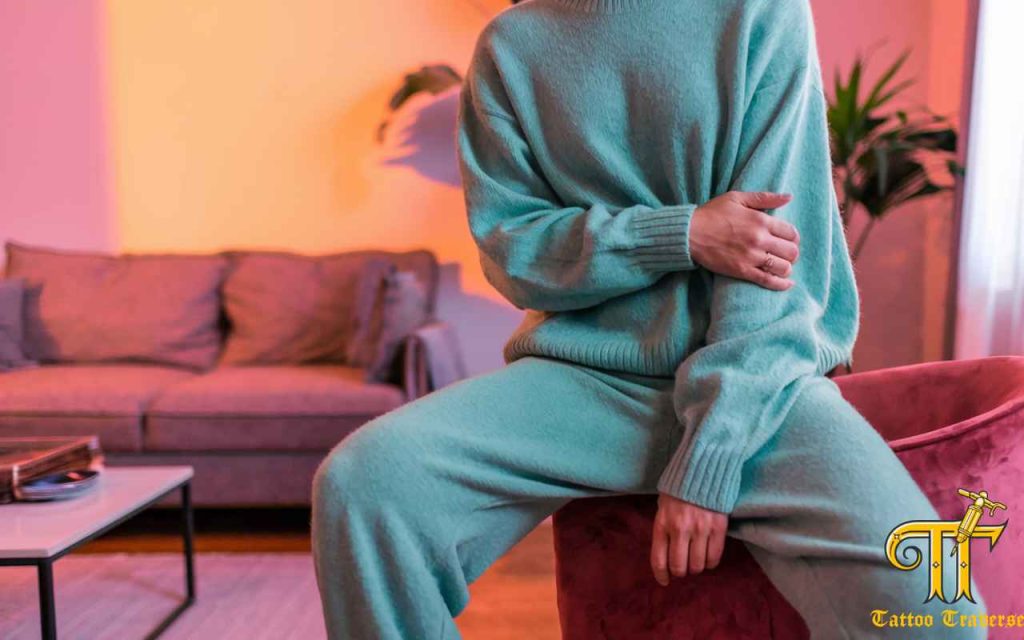
When settling in for the night with a tattooed area, particularly a thigh piece, your choice of clothing can make or break your comfort. Ditch the skinny jeans and any tight attire that might cling to your skin. Instead, opt for soft, loose, and practical garments that facilitate healing and prevent irritation.
This type of outfit helps you move freely in your sleep and reduces the hassle of waking up to discomfort. Remember, the right clothing not only protects your new ink but also enhances your overall sleep quality, ensuring you wake up feeling refreshed and your tattoo well-cared for.
7. Moisturize Your Skin
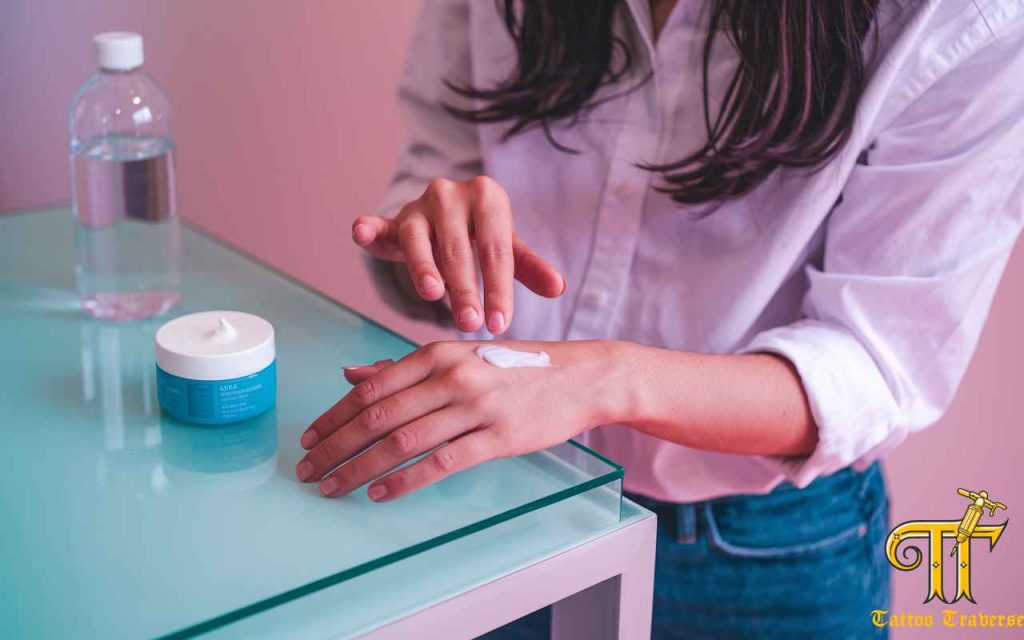
Maintaining your skin’s elasticity after getting a tattoo is crucial, especially when it comes to sleeping comfortably through the night. A fresh tattoo turns your skin into a tricky canvas that requires gentle care to ensure proper healing. To prevent your tattooed area from becoming dry and non-elastic, it is important to apply a moisturizing lotion or cream regularly. If you’re unsure about what to apply on your tattoo once it’s done, make sure to check out the proper aftercare instructions
Opt for products that are rich in coconut oil, as it is excellent for maintaining moisture and aiding the healing process. This routine should start a week before your tattoo appointment and continue as your tattoo heals. If you’re wondering what lotion to use on tattoo, choosing one that is specifically formulated for tattoo care is ideal. By doing so, you help preserve the artist’s work and ensure your tattoo remains vibrant and intact as you heal.
8. Stay Sober

It’s important to attend your session fully sober When you are planning for your first tattoo. Consuming alcohol or using drugs might seem like good solutions to manage pain or frighten you feel about the needle and process. However, these substances can dangerously thin your blood, leading to serious complications.
Being turned away at the appointment because you are under the influence is a real risk. Instead, discuss any prescription medication you’re taking with your healthcare provider to ensure it’s safe to get tattooed. Remember, substances that thin the blood, such as aspirin, should be avoided to prevent any danger during the tattooing process.
Getting a tattoo the first time? Also, check this to make your ink journey great.
9. Bring Snacks and Entertainment
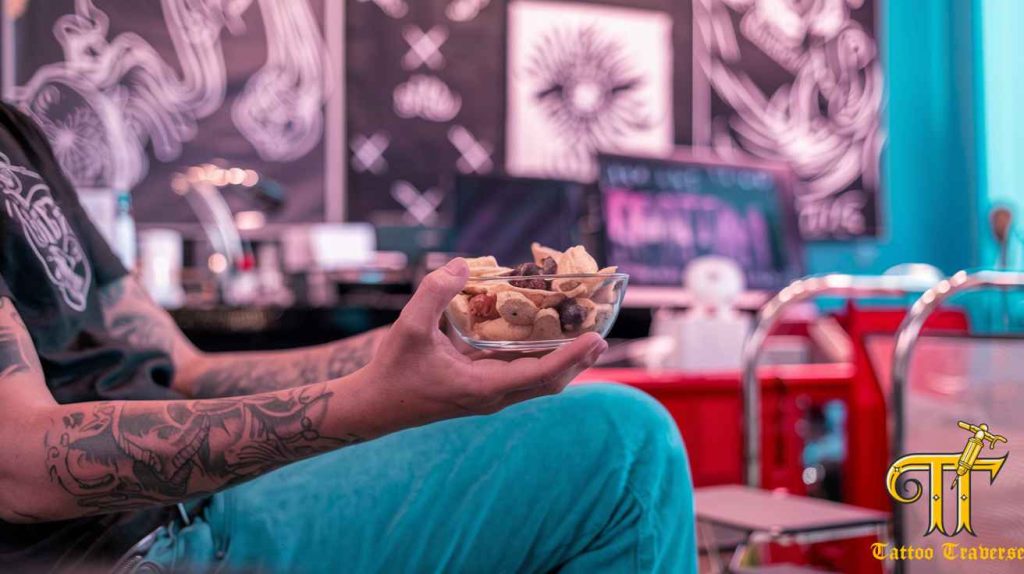
When gearing up for a tattoo session, it’s crucial to avoid walking into the studio hungry. A hungry body is not a good way to start an appointment where your skin will constantly move under the needle. To make sure your body is handling the stress appropriately, I always recommend bringing snacks to your appointments.
Eating a balanced, healthy meal before you arrive can help keep you mentally alert and avoid the discomfort of feeling light-headed or the risk of passing out due to exhaustion. If the session runs long, don’t hesitate to ask your artist for breaks to refuel. This strategy deals effectively with the intensity of getting inked and ensures you’re not starving, which can detract from the experience and your body’s ability to cope.
Final Thoughts
Building a good connection with your tattoo artist and prioritizing the design is very important. Managing pain in sensitive areas with numbing cream or ibuprofen can make the session more comfortable. Keep yourself distracted by talking or having candy, and always ensure the ink’s quality. Avoid tattooing over birthmarks or moles, and remember that flaky skin afterward is normal. If anything concerns you, don’t hesitate to raise it, as tattoos carry personal meanings that can change over time.
Prepare yourself by eating a good meal a couple of hours before your session and getting plenty of rest. Meditating or stretching beforehand can help ease pre-tattoo tension. Lastly, avoid scheduling your appointment on stressful days or during your period if you experience strong cramps.

